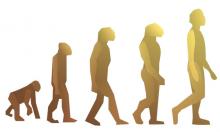Lately we've had a minor revelation about the extinction of the dinosaurs.
But new research reveals another factor that may have played a role in ending the era of the most massive creatures to ever walk the planet: It seems dinosaur eggs took a particularly long time to hatch. That means that when they had to compete for sparse resources in a post-extinction-event world with the more efficient amphibians, reptiles, birds, and mammals that made it through that era into the next one, dinosaurs may have lost out.
Setting aside how well this media outlet might have botched the reporting on the research, or how well the research was done, I thought there's an important point about evolutionary theory to be had.
"Survival of the fittest" is bullshit.
That phrase wildly corrupts a person's perception about how Evolution works. That's mostly because people plug in whatever their subjective opinion they have about what qualifies as "fittest". "Shouldn't everything be evolving to be smarter, larger, faster, stronger?", the creationist objects.
Well, no. Circumstances may be that being a small, low-metabolism weakling is what keeps you alive in an environment. "The environment" also includes the influences of other lifeforms. So you may have two species in the same environment, one where being large and high-metabolism, and the other being small and low-metabolism, are the "fittest" versus each other.
It's not intuitive. All that matters is that the lineage survives to reproduction... any way that could happen.
"Fittest" is not a global quality that's true regardless of circumstance. In the case of these dinosaurs, the extended hatching duration of the eggs may have been a "fittest" scenario before the rapid environmental change, then suddenly (geologically speaking), the same feature became a liability, and having a not-extended hatching duration was then "fittest" for them. Since the environment changed too quickly for evolutionary adaption, they couldn't keep up.
Strength is not an automatic win. It requires more calories to operate than having low muscle mass. It's a similar issue with intelligence. A larger brain also means more calories. So if the food isn't present anymore, that strength or intelligence is no longer "fit".
It gets you extinct.
Intelligence may be the most misunderstood. Evolution doesn't automatically drive all species towards being smarter. Many species survive to reproduction simply by reproducing like mad. Statistically speaking, some of the next generation will survive through chance. Chickens, rabbits, shrimp and bacteria fall into that category. It works.
The value of intelligence has tiers.
A pack of wolves that have higher-than-average intelligence may be too effective at hunting the local food supply. Then they all starve, and that lineage dies out. However, if they're "just smart enough", some may die of starvation, but the local population of wolves may survive to reproduction as a whole, because they don't deplete the food.
On the other hand, if the scenario has the right circumstances, the wolf lineage may grow in intelligence enough so that they realize they need to "farm" the food responsibly... or figure out how to establish food supplies intentionally. That essentially happened with humanity and agriculture.
Of course, my descriptions are very loose and crude, and probably inaccurate in places, but my point is that it's not always obvious or intuitive what results Evolutionary model would produce.
Arguably, humanity's intelligence - between nuclear proliferation, pollution and anthropogenic climate change - may drive itself extinct... so maybe not so "fit"?

